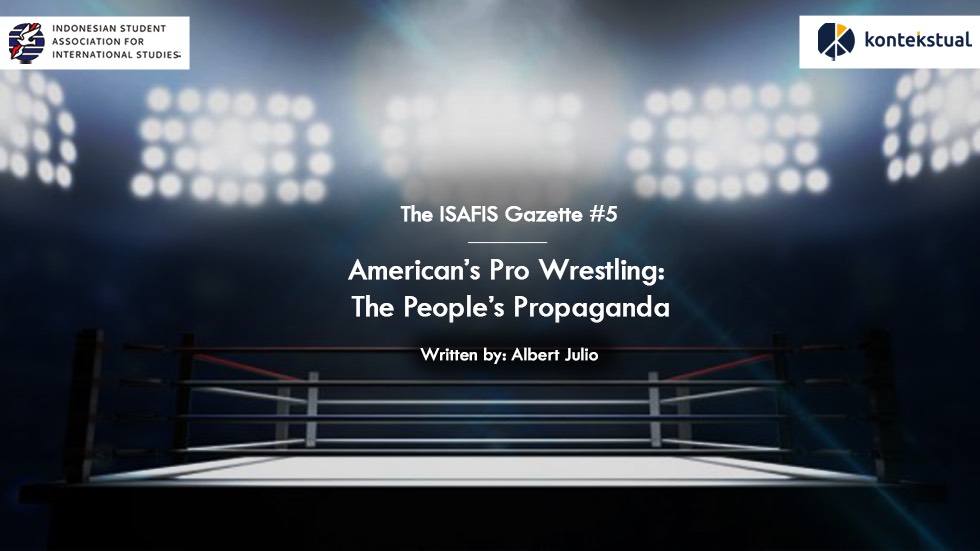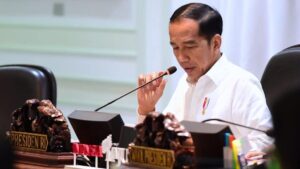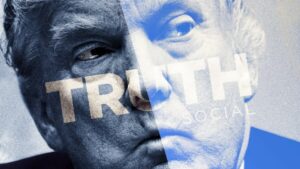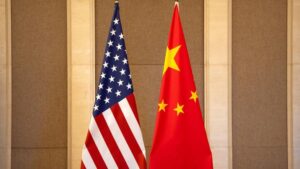American Pro Wrestling: The People’s Propaganda

Illustration from ISAFIS.
This article is originally published on ISAFIS’ Medium. Click here to be redirected.
Propaganda is, more or less, the systematic effort to manipulate other people’s beliefs, attitudes, or actions by utilising symbols (words, gestures, banners, monuments, music, clothing, insignia, hairstyles, designs on coins, and postage stamps, and so forth). States and corporations have used propaganda to convey messages and create a bandwagon of supporters since the start of the media age. According to Terry Hicks (2016), traditional propagandas are very political and not at all discrete, hence creating this stereotype in people’s minds on what propaganda should look like (such as the USA’s Uncle Sam character). Traditional propaganda tends to involve high political matters and is usually ignored by apolitical people. However, no matter how much people try to stray away from propaganda, they are always affected by them in some ways. Propaganda that can affect people but not look political to the blind eye is called subliminal propaganda (Loftus and Klinger, 1992). The USA is one of the most prolific actors in creating subliminal propagandas, and one of the best methods that the government operates it is through the wrestling entertainment industry. This essay talks about the pro wrestling entertainment industry, specifically about World Wrestling Entertainment (WWE) and its connection towards the world of propaganda.
A typical wrestling match setting would have the two athletes pitted against each other, usually polarized to good and bad (referred to as “face” and “heel” in wrestling). This particular casting made wrestling a suitable tool to present allegiances towards certain political spectrum, creating an “us against them” narrative as referred to by Harry Truman in the Truman Doctrine (Beschloss, 2006). Basically, what is deemed to be a harmless and scripted match turns out to be one of the ways the media forces the audience to pick sides. Thus, WWE and pro wrestling have been cited as a form of media diplomacy for people in the USA. The characteristics of wrestling that are easy to grasp made it a great way to reach and be accessible to everyone.
Wrestling materialized as a nationalistic American propaganda during the Cold War period. Citing Peter Kerr (1989), in this era, audiences still believed that wrestling is “real” and not scripted (the revelation of its scripted nature came on 10 February 1989 when WWE registered their brand as “entertainment” and not “sports”). During this time, WWE booked Bruno Sammartino, an Italian-American, as their “Main Guy” and champion for seven years. This was considered to be a move to promote a new diaspora that has arrived in the USA, the Italian-Americans. Sammartino was personified to be a really strong wrestler who never lost a match—until he eventually lost to Ivan Koloff, a supposed “Russian Bear”. This loss was supposed to draw heat from crowds, considering Koloff was playing a Soviet character at that time (Greer, 2020). The propaganda becomes even more visible once you realize Koloff is actually Canadian. Sammartino would win the belt again in 1973, beating Stan Stasiak, another Canadian playing the Soviet gimmick.
Since then, WWE has had a habit of portraying foreigners as villainous heels or weak comedic relief face characters. Vice versa, WWE also portray their main wrestlers to be a nationalist American, just as Bob Backlund’s “people’s chief” gimmick or Hulk Hogan’s “real American” theme—a character Hogan still utilizes now. This has led to several accusations of WWE being racist, though one might believe that WWE is more chauvinistic in their approach. WWE still gives people from minority groups and foreigners, or at least originating from countries that have no bad relations with the USA, chances at being second-tier champions, or sometimes the main champion. However, it is worth noting that, according to WWE’s official records, there have only been three black world champions, several Hispanics, and only one Asian world champion over the years. There just seems to be this exclusivity for Americans to be the world champion.
WWE showcased the grandeur of their diplomatic prowess essentially by commanding the American public to hate Iraq during the Gulf War. This was done by gracing the world champion title on Sergeant Slaughter, an American-turned Iraqi Sympathizer, and scheduling him to be defeated by Hulk “Real American” Hogan (Koh, 2020). In more modern times, WWE worked with Saudi Arabia to hold events in Riyadh annually to promote Saudi Arabia’s good relationship with the USA. This event is also a way to introduce Saudi Arabia to more western thinking, hence creating a more western “freedom”. Such freedoms are expressed by WWE by holding the first women’s wrestling match in Saudi Arabia, which some consider as breaking barriers (Jones, 2019).
Wrestling can be considered one of the phenomena that implanted nationalistic views through symbolism in the USA. Professional wrestling has this upper hand compared to other sports in catering propaganda as they operate with scripted matches. The constant feeding of a winning protagonist, in this case the USA, against actors which have “evil” characters certainly is more effective. The narratives and storylines also sometimes lead the viewers to root for a certain group of people, unknowing that they are slowly creating a parameter in their thinking-frame. This kind of American exceptionalism is also a strong trait in winning the people’s trust, as shown by Donald Trump’s “America First” mentality (Edwards and Weiss, 2011).
In conclusion, pro wrestling is one of the greatest American tools used to feed its propaganda to the masses subliminally. The nature of a wrestling match and narrative that is similar to the Truman Doctrine, as well as its popularity among the masses, has made it a perfect tool for spreading propaganda. This culture has also not stopped even until today, meaning that pro wrestling is rooted in American culture, thus making WWE able to be considered as an actor in diplomacy. Its chauvinistic theme shows what is wrong with patriotism in America nowadays.
Bibliography:
Beschloss, Michael (2006). Our Documents: 100 Milestone Documents from the National Archives. Oxford, England: Oxford University Press.
Edwards, Jason A., and David Weiss (2011). The Rhetoric of American Exceptionalism: Critical Essays. Jefferson, NC, USA: McFarland & Co.
Greer, Jamie (2021, January 19). “50 Years Ago: Record Reign of Bruno Sammartino Ends at 2803 Days.” Last Word on Pro Wrestling. Last Word on Pro Wrestling Website, January 19, 2021. https://lastwordonsports.com/prowrestling/2021/01/19/bruno-sammartino-ivan-koloff-50-year
Hicks, Terry Allan (2007). Uncle Sam. New York, USA: Marshall Cavendish Benchmark.
Jones, Elton (2019, October 31). “WWE Crown Jewel 2019: Reactions & Review.” Heavy.com, October 31, 2019. https://heavy.com/sports/2019/10/wwe-crown-jewel-2019-reactions-review/
Kerr, Peter (1989, February 10). “Now It Can Be Told: Those Pro Wrestlers Are Just Having Fun.” The New York Times. The New York Times, February 10, 1989. https://www.nytimes.com/1989/02/10/nyregion/now-it-can-be-told-those-pro-wrestlers-are-just-having-fun.html
Koh, Wilson (2020). “A Real American Hero: WWE Wrestling from American Exceptionalism to Commercial Transnationalism.” Television & New Media. https://doi.org/10.1177/1527476420964722
Smith, Bruce Lannes (2016, February 17). Propaganda. Encyclopædia Britannica, inc., https://www.britannica.com/topic/propaganda
WWE (2021, March 1). “WWE Championship.” WWE. WWE.Com, March 1, 2021. https://www.wwe.com/titlehistory/wwe-championship
Albert Julio is an International Relations student in Universitas Indonesia and one of ISAFIS’ Research and Development Division Staff. He can be found on social media with the username @im.the.aj (Instagram) or @YoungZhouEnlai (Twitter)





